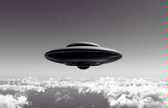

Farmacopea fantástica: top 10 drogas en la ciencia ficción. La relación entre las drogas y la ciencia ficción es la de una pareja hecha en el cielo, las dos son senderos de exploración por las profundidades de la mente humana -universo adentro.
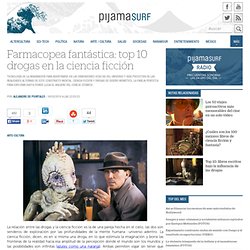
La cienca ficción, dicen, es en sí misma una droga, en lo que estimula la imaginación y borra las fronteras de la realidad hacia esa amplitud de la percepción donde el mundo son los mundos y las posibilidades son infinitas (azules como una naranja). Ambas permiten viajar sin tener que moverse, y quizá demuestran, al atravesar el universo en las páginas de un libro o en el humo de una pipa, el principio holográfico del cosmos: todo está en todas partes y en cada una: eterno cordón multiumbilical de Indra por el agujero de conejo hacia el Aleph -ubicuo útero- en la computadora cuántica del Hacedor de Estrellas. Carl Jung hacía una relación entre las drogas y el sentimiento religioso (océanico le llamaba Freud); la necesidad ancestral (astral) de drogarse es la misma sed de Dios. 10.
Ephemerol- 9. 8. 7. 4. Sociedad Hispánica Jules Verne - Publicaciones.
Utopía? Philip K. Dick. Posthumanismo. New Flesh. HistSciFi2.jpg (JPEG Image, 4400 × 2305 pixels) - Scaled (23%) Space Opera. Cyberpunk. “Tocarle el hombro a Borges” Miguel Huezo Mixco (Cuentos (in)completos y maravillosos.
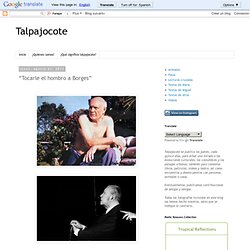
Álvaro Menen Desleal, DPI, San Salvador, 2010. Rafael Menjívar Ochoa, compilador) —Eso fue —me dijo— como tocarle el hombro a Borges, como invocar a un genio. Quien recuerda es Álvaro Menen Desleal, narrador, dramaturgo y periodista, que, en un arranque de vanidad o inspiración, tuvo la osadía de fabricar para uno de sus libros una “carta” firmada por Jorge Luis Borges.
Kierkegaard dejó dicho que un prólogo es un impulso: como escupir por la ventana. Esta historia ya ha sido contada otras veces. La historia es esta: en 1962, Álvaro Menen Desleal ganó el segundo lugar (compartido) en el Certamen Nacional de Cultura de El Salvador con un libro que era todo un tributo a Borges. Mi querido amigo: Al conocer sus Cuentos breves y maravillosos, pienso que no fue meramente accidental que Kafka escribiera La Muralla China: se repite en usted la nota de lo que con Bioy Casares llamamos las antiguas y generosas fuentes orientales… Sr. Imágenes:
Mir space station. The Hugo Awards. Short Story. The Hugo Award for Best Short Story is one of the Hugo Awards given each year for science fiction or fantasy stories published in English or translated into English during the previous calendar year.
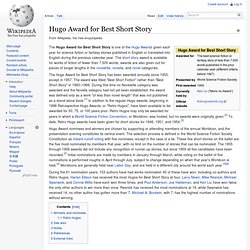
The short story award is available for works of fiction of fewer than 7,500 words; awards are also given out for pieces of longer lengths in the novelette, novella, and novel categories. The Hugo Award for Best Short Story has been awarded annually since 1955, except in 1957. The award was titled "Best Short Fiction" rather than "Best Short Story" in 1960–1966. During this time no Novelette category was awarded and the Novella category had not yet been established; the award was defined only as a work "of less than novel length" that was not published as a stand-alone book.[1] In addition to the regular Hugo awards, beginning in 1996 Retrospective Hugo Awards, or "Retro Hugos", have been available to be awarded for 50, 75, or 100 years prior. Winners and nominees[edit] Retro Hugos[edit]
Novella. The Hugo Award for Best Novella is one of the Hugo Awards given each year for science fiction or fantasy stories published in English or translated into English during the previous calendar year.
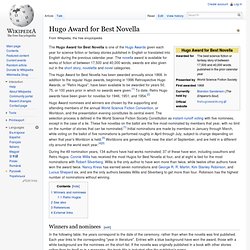
The novella award is available for works of fiction of between 17,500 and 40,000 words; awards are also given out in the short story, novelette and novel categories. The Hugo Award for Best Novella has been awarded annually since 1968. In addition to the regular Hugo awards, beginning in 1996 Retrospective Hugo Awards, or "Retro Hugos", have been available to be awarded for years 50, 75, or 100 years prior in which no awards were given.[1] To date, Retro Hugo awards have been given for novellas for 1946, 1951, and 1954.[2] Hugo Award nominees and winners are chosen by the supporting and attending members of the annual World Science Fiction Convention, or Worldcon, and the presentation evening constitutes its central event.
Winners and nominees[edit] * Winners and joint winners Retro Hugos[edit] Novelette. The Hugo Award for Best Novelette is one of the Hugo Awards given each year for science fiction or fantasy stories published in English or translated into English during the previous calendar year.
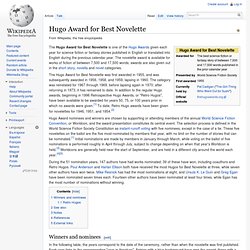
The novelette award is available for works of fiction of between 7,500 and 17,500 words; awards are also given out in the short story, novella and novel categories. The Hugo Award for Best Novelette was first awarded in 1955, and was subsequently awarded in 1956, 1958, and 1959, lapsing in 1960. The category was reinstated for 1967 through 1969, before lapsing again in 1970; after returning in 1973, it has remained to date. Novel. Steampunk.
BeInSpace.